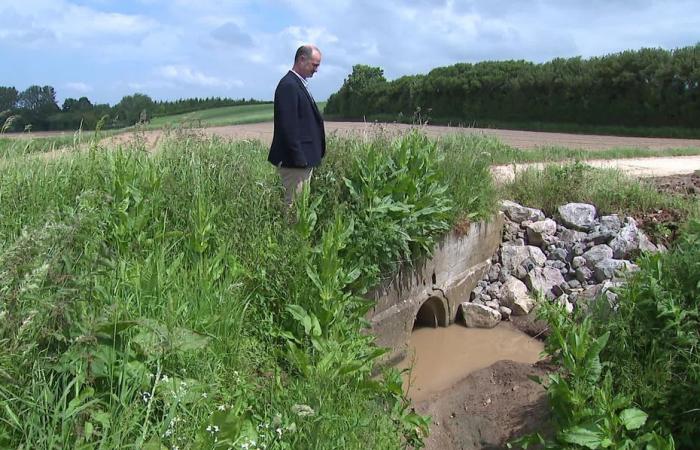Due to its geographical typology, the village of Andres, in Pas-de-Calais, is particularly subject to flooding from the Hem river. Particularly because of wateringues, a water evacuation system common to several municipalities, which is increasingly criticized.
The essentials of the day: our exclusive selection
Every day, our editorial team reserves the best regional news for you. A selection just for you, to stay in touch with your regions.
France Télévisions uses your email address to send you the newsletter “Today’s essentials: our exclusive selection”. You can unsubscribe at any time via the link at the bottom of this newsletter. Our privacy policy
On the banks of the Hem, in Andres (Pas-de-Calais), there is a panel installed about ten years ago. We can read explanations on the hydraulic installations told from the point of view of the river: “When they widened the canal they broke my siphon. They didn't rebuild it! Impossible to reach the sea directly. Since then, I have been going up the canal against the current for three kilometers! What do you want ? Now I sometimes bother men. I get out of bed. Don’t you think they looked for it a bit?”
Information panel located on the banks of the Hem.
•
© France Télévisions
The canal was widened for the passage of barges which were to transport heavy materials to Calais for the construction of the Channel Tunnel. With the consequences of slowing down the flow of water, stagnation and overflowing. During the floods in 2023, the village of Andres, which has 1,600 inhabitants, counted around thirty damaged houses.
“Enlargement is not the only cause, but it is an aggravating situation by the hands of man”, deplores the mayor of Andres, a commune in Pas-de-Calais particularly affected due to its geographical location. A year later, everyone fears the next episodes in the face of a recurring problem.
When the threshold is too high, the water that flows naturally cannot flow into the small channels, it stagnates and spreads.
Arnaud Gauthierhydrogeologist
“The watercourse which passes through the town will flow into the watering holes downstream. The big concern comes from this artificially regulated water evacuation. When the threshold is too high, the water that flows naturally cannot flow into the small channels, it stagnates and spreads”explains Arnaud Gauthier, hydrogeologist and professor at the University of Lille.
Behind the term wateringues is a water evacuation system created in the Middle Ages to regulate the water level of low-lying lands and evacuate excess towards the sea. In view of repeated floods, works thanks to a network of ditches and canals of 1,500 kilometers which cover the territories of Calais – Dunkirk – Saint-Omer are now criticized.
To illustrate the system, hydrogeologist Arnaud Gauthier describes a waterfall or stair step system “which works in good harmony but where everyone wants to maintain a certain level and would like the other to make an effort”, he notes.
An interdependence that is difficult to manage on a daily basis between all the players. Around Hem, all the villages are subject to this common problem which does not fail to create tensions, without any compromise being found.
We call it basin solidarity but in reality it is a bag of knots. This system is not adequate.
Allan Turpinmayor of Andres
“We call it basin solidarity but in reality it’s a bag of knots. This system is not adequate,” advances the mayor of Andres and president of the association “Stop flooding Pas-de-Calais”Allan Turpin, who calls for concrete work to make way for “too many studies” already carried out in the field.
But above all to respond to the fatigue of its citizens in the face of administrative inertia while the threat of flooding continues to grow, as the hydrogeologist recalls: “The system needs to evolve because environmental conditions change much more quickly than one might expect. We won’t be able to do much about the precipitation.”






